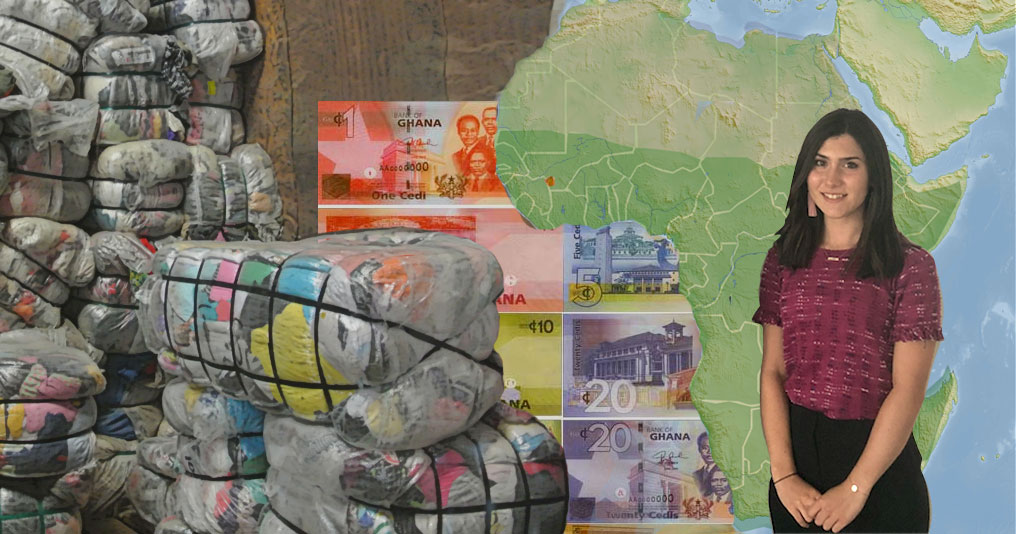

Used clothing trade: Blessing or curse?
Photo courtesy of Shannon Brady | Photo illustration by Jeffrey Chase August 14, 2018
Shannon Brady investigates the effects of second-hand clothing in sub-Saharan Africa
Editor’s Note: Get to know a dozen of our 2018 undergraduate Summer Scholars in this series of question/answer profiles on them and their work. The Summer Scholars program offers undergrads an expansive menu of research and service opportunities from the streets to the field to the laboratory. A record number of students - more than 530 - participated this summer. It’s a mark of distinction for UD, according to Associate Prof. Iain Crawford, faculty director of UD’s Undergraduate Research Program and president of the national Council on Undergraduate Research: “We have that culture firmly established at Delaware, where the value of undergraduate research is strongly felt.” To learn about the work of some of this year's Summer Scholars, visit https://www.udel.edu/home/summer-undergrad-research/.
Shannon Brady is a senior fashion merchandising major from Arlington, Virginia.
Q: What is your research focus at UD?
Brady: I am studying the second-hand clothing trade and the effects it has on textile and apparel industries in sub-Saharan African countries with Sheng Lu, associate professor in the Department of Fashion and Apparel Studies at the University of Delaware.

Q: What interest you most about this?
Brady: Like many UD students, I am concerned with sustainability issues, especially those that relate to my field of study — fashion. When I learned that most of the used clothing we donate to nonprofits such as Goodwill Industries or the Salvation Army end up in some of the poorest countries in the world, including in Africa, I was really surprised. I also learned that some countries plan to ban the import of used clothing in order to develop their local textile and apparel industry. I wanted to explore this hotly debated issue to delve deep into both sides to understand the effects of used the clothing trade on textile and apparel production in African countries.
Q: What is a typical day like?
Brady: A typical day for me varies, which keeps it interesting. Sometimes I am doing a bit of reading, sometimes I am looking at trade statistics and sometimes I am in Washington, D.C. conducting interviews. An average day includes meeting with my research group; this is the time where I can bounce ideas and workshop my research presentation so it is ready for the end of summer research symposium. Meeting with other scholars is helpful for gaining an outside perspective on my work. After that, I typically do some reading to get an idea about big-picture issues relevant to my research. Historically, the textile and apparel industry has been a stepping stone towards economic development in Africa and other developing countries, but this is affected by the import of used clothing. Looking at specific trends and analyzing trade data can help me answer most of the questions I have, and can even help me ask myself new questions.
Q: What is the coolest thing you’ve gotten to do on the project?
Brady: The coolest thing about this project is being able interview high level experts on this issue. This includes people such as the U.S. trade representative for textiles, senior trade officials from the U.S. Department of Commerce and presidents from leading U.S. fashion apparel industry associations. As an undergraduate student, I did not think I would have an opportunity like this, but I am so glad that I have. I also attended a trade symposium organized by the U.S. Fashion Industry Association (USFIA) on Capitol Hill, where I learned about the most pressing trade issues happening in the fashion industry right now, such as the renegotiation of the North American Free Trade Agreement (NAFTA). Learning from experts in this field has been a really great experience and one that has given me much to think about.
Q: What has surprised you the most about your experience?
Brady: I would say the most surprising thing about my experience is what I have found through my research process. I had no idea that the global used clothing trade was so big; the numbers are staggering. According to UNComtrade data (run by the United Nations), the world used clothing trade exceeds $3.7 billion annually. Before exploring this topic, I thought of used clothing as the clothing sold in stores like Goodwill. Now I have learned that it is a profitable global trade with many stakeholders on either side of the globe, and a lot of complicated economic, political and legal issues, too.
Q: Dreaming big, where do you hope this work could lead?
Brady: I hope that this research can lead to more public awareness about the consequences of our clothing choices. Whether it is consumption or disposal, it is important to evaluate the impacts of how we consume clothing. I am someone who is immersed in learning about the fashion industry, and I had no idea about the magnitude of the second-hand clothing trade. The second-hand clothing that we donate to these countries saturates their textile and apparel market and, consequently, makes it harder for these countries to develop their own domestic industries, which is an important step towards economic development. If more people paid attention to this issue, there could be an opportunity to advocate for ways that used clothing can benefit everyone involved in the trade.
Q: If you had to summarize your experience in only one word, what would it be?
Brady: Eye-opening
Q: What do you enjoy when you are not doing research?
Brady: I love exploring Washington, D.C. in my free time. It is such a fun and bustling city, there is always something new to try out. I also enjoy cooking and, in my time off, I have been teaching myself to cook and bake. I enjoy keeping up with all things fashion through social media and magazines like Vogue, too.
Contact Us
Have a UDaily story idea?
Contact us at ocm@udel.edu
Members of the press
Contact us at 302-831-NEWS or visit the Media Relations website


